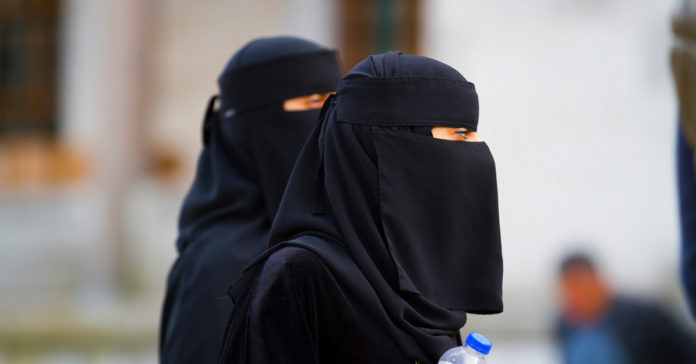5Pillars understands that two London-based Shia Muslim channels have an unofficial policy of rejecting guests who wear the niqab.
According to verified testimony by a concerned whistleblower, a senior boss at Imam Hussain TV, which broadcasts on satellite, has verbally warned staff not to invite female guests who cover their face.
Imam Hussein TV is an Iraqi channel associated with the Shirazi camp that broadcasts in English, Farsi, Arabic, Turkish and Urdu.
5Pillars reached out to the manager for comment but he denied the accusations, adding that his English wasn’t good enough to talk in-depth.
Additionally, 5Pillars reached out to a senior producer, Syed Murtadha Housain, to ask if this was an official channel policy.
When asked if Imam Hussain TV stood by the manager’s alleged comments or if they had any examples of guests who wear the niqab or burqa being invited on to speak, Syed Murtadha said: “We have no comments on the subject.”
After receiving the initial complaint, 5Pillars launched a deeper investigation into the conduct of other English speaking Sunni and Shia Muslim channels.
Subscribe to our newsletter and stay updated on the latest news and updates from around the Muslim world!
While Sunni channels seem to have no such reservations about niqabis and can point to guests who have appeared in niqab, one more example of an anti-niqab attitude was discovered.
Sayed Abbas Abedi, a cleric working at the Iran-affiliated Islamic Centre of England and founder of the recently launched Sincere Community Services (SCS), (a programme series that covers Muslim related issues) admitted when asked that the niqab/burqa is a model of hijab “better avoided.”
5Pillars has also been provided WhatsApp messages which show Sayed Abbas condemning Islamic face coverings as a “Wahabi practice” which “should not be encouraged.”
When asked if this position was officially adopted by the Islamic Centre of England he replied: “It’s a logical approach of pure Islam.”
When questioned further on his views, Sayed Abbas said: “Even Lady Zainab (the daughter of Prophet Muhammad pbuh) delivered several speeches where people saw her and recognised her too.”
5Pillars reached out to other English language channels including Ahlulbayt TV and Ahlebait TV – two platforms that boast tens of thousands of followers on social media and maintain a Sky TV presence.
Hussein Sajjad Hussein, who is director of marketing and public relations at Ahlulbayt TV, told 5Pillars: “We don’t have an issue, we never have had an issue… If there’s an issue with one channel that did not allow a niqabi to enter or be part of their programmes then that is an issue with that particular TV channel. Why are they (5Pillars) starting to try and bully and bring other channels into the limelight?”
And Mr Abu Zar, a senior producer at Ahlebait TV, told 5Pillars: “We don’t have any discrimination against niqabis and we already done some programmes with niqabis.”
Mr Zar did admit, however, that it had been “too long” since a niqabi had appeared or been invited to speak on the channel.
While both channels emphasised their inclusive policies both failed to provide any examples of face-veiled guests being platformed.
However, 5Pillars did find plentiful examples of niqabis appearing as guests on the Iranian news channel, Press TV.
Islamic scholars of all schools and sects unanimously agree that the hijab is compulsory according to Islam, although they differ when it comes to the niqab.
The niqab has a mainstream, normative basis within at least two of the four Sunni schools of jurisprudence.
A Muslim woman’s face being “awra” that requires covering is held by the Hanbali school and is a matter of dispute in the Shafi’ school. However, depending on societal circumstances, the Hanafi and Maliki schools have also stipulated exceptional cases where the face covering could become mandatory for women.
And indeed in some Muslim countries, including Yemen and Saudi Arabia, the niqab is commonplace.
No Shia school of thought explicitly forbids the niqab although some Shias have begun to associate it with “Wahabism” and “Salafism.”
While the niqab is less common in Shia majority Muslim countries, similar versions of veiling can be found such as the chador in Iran.
Although the practice of face-veiling existed in the Middle East before the arrival of Islam, female face covering has an Islamic tradition dating back to the early years of Islam. For example, it is widely accepted that the Prophet’s wives were all covered.























